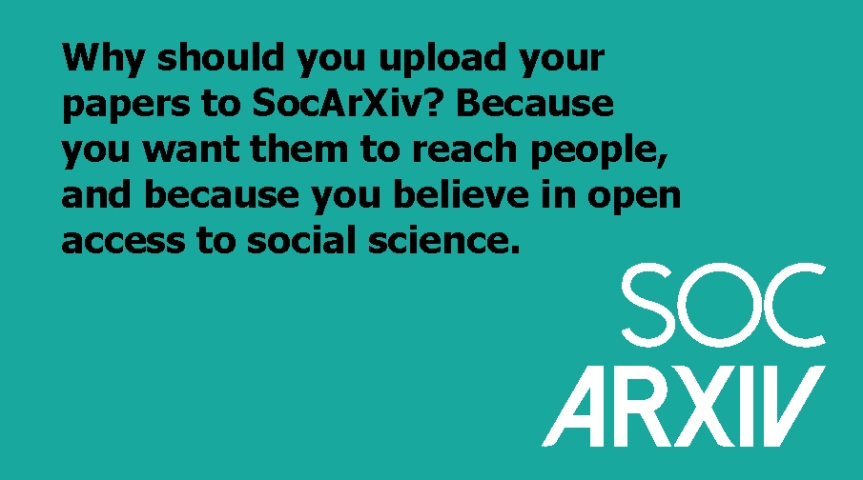In honor of the American Sociological Association annual meeting, which starts on Saturday, I’m highlighting a handful of SocArXiv papers that will be presented at the conference. Their time/location is noted below as well. If you’ve just shared an ASA paper of your own with your discussant (and if you haven’t, time to get moving), consider uploading it to SocArXiv as well. You can always update it with a revised version later.
A related note—as I’ve been collating these the past few months, I’ve been noticing a pretty heavy gender imbalance in my selections, even though I’ve been paying attention. At first I thought it was my subfield tastes or implicit bias, but looking more closely, the pool itself is quite male-dominated—certainly more so than the discipline as a whole. So women in particular, please consider sharing your papers!
And last point—a few days ago I noticed that a version of a SocArXiv paper by Penn State demographer Alexis Santos-Lozada and colleague Jeffrey T. Howard on excess deaths in Puerto Rico after Hurricane Maria, was just published in JAMA. Santos-Lozada’s research was highlighted here last month pre-publication. Congratulations—it’s important work.
Standard disclaimer: I make no claim to peer review or formal evaluation of the papers here. Read it yourself before you cite.
Market crises as disasters: the social meaning of financial risk in 401(k) retirement accounts
Section on Economic Sociology Refereed Roundtable Session
Mon, August 13, 4:30 to 5:30pm, Pennsylvania Convention Center, Level 100, 113A
This very interesting paper links econ soc with the sociological literature on disasters to understand how experience of a stock market crash causes households to shift their 401(k) investments toward long-term conservatism. This is consistent with neither neoclassical or behavioral economic predictions, but fits predictions regarding the social amplification of risk. Unfortunately, this social reaction may not bode well for retirement savers in the long run—not a good sign as bankruptcy rises among older Americans.
Samuel Perry, Andrew Whitehead, and Joshua Davis
Religion, Politics, and Donald J. Trump
Sat, August 11, 10:30am to 12:10pm, Philadelphia Marriott Downtown, Level 4, Franklin Hall 7
ASA’s theme this year is “Feeling Race”, and this paper on Christian nationalism and attitudes about police mistreatment of blacks is certainly relevant. Drawing on a national probability sample, it shows a relationship between Christian nationalism, measured by agreement with statements like “The federal government should declare the United States a Christian nation,” and beliefs about differences in how U.S. police officers treat blacks and whites. There is a strong relationship between Christian nationalism and believing the police treat people of all races similarly, unsurprisingly, but with some unexpected twists: the relationship declines with increasing religious activity, and it holds for nonwhite Christian nationalists as well as white ones.
Duality in Diversity: Cultural Heterogeneity, Language, and Firm Performance
Matthew Corritore, Amir Goldberg, and Sameer Srivastava
Culture and Organizations
Sat, August 11, 4:30 to 6:10pm, Philadelphia Marriott Downtown, Level 4, Franklin Hall 4
Much of the conversation around diversity—certainly the legal conversation around affirmative action—is grounded in the idea that diversity is beneficial for everyone in an organization. In terms of organizational capacity, the working assumption is usually that of a tradeoff between better coordination (with homogeneity) or more creative problem-solving (with diversity). This paper shifts that conversation by examining intrapersonal diversity—having individuals with more internally heterogenous beliefs. Drawing on data from Glassdoor, the paper argues that interpersonal heterogeneity worsens organizational coordination, while intrapersonal heterogeneity facilitates creativity. An interesting angle with implications for debates over the effects of diversity from Google to higher ed.
Gender trouble beyond the LGB and T: Gender Image and Experiences of Marginalization on Campus
Kari J. Dockendorff and Claudia Geist
Section on Sociology of Education Refereed Roundtable Session
Sun, August 12, 2:30 to 3:30pm, Philadelphia Marriott Downtown, Level 5, Salon H
Finally, Dockendorff and Geist survey a pool of American undergraduates to better understand the experiences of trans and nonbinary students, particularly focusing on students who report others perceiving them as androgynous or of a different gender than they perceive themselves, finding higher levels of self-reported marginalization among those who identify “beyond the binary”. The paper makes innovations in gender measurement as well as exploring student experiences around gender marginalization in new ways.
Enjoy the remaining days of summer, whether you’re heading to ASA in Philly, lounging by the beach, or just heading to the office.



